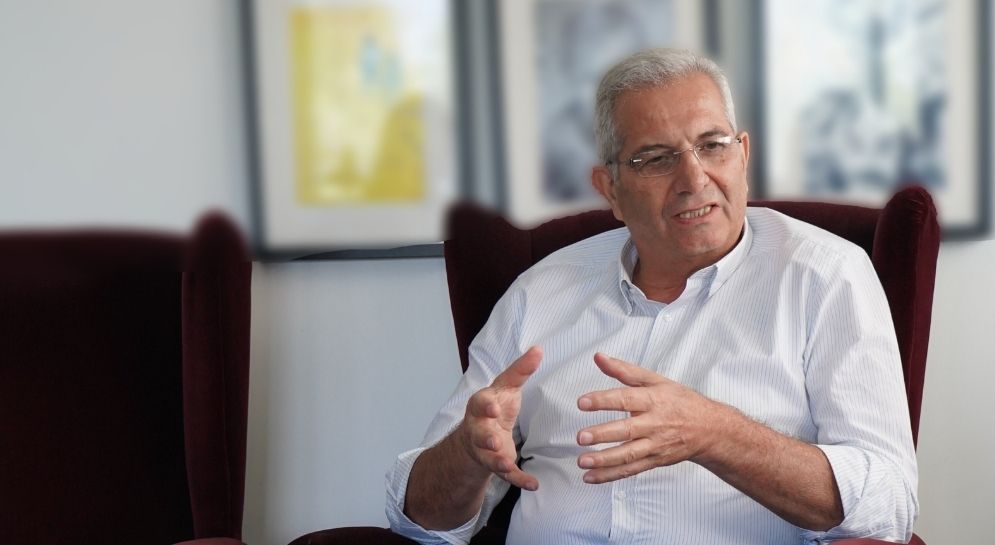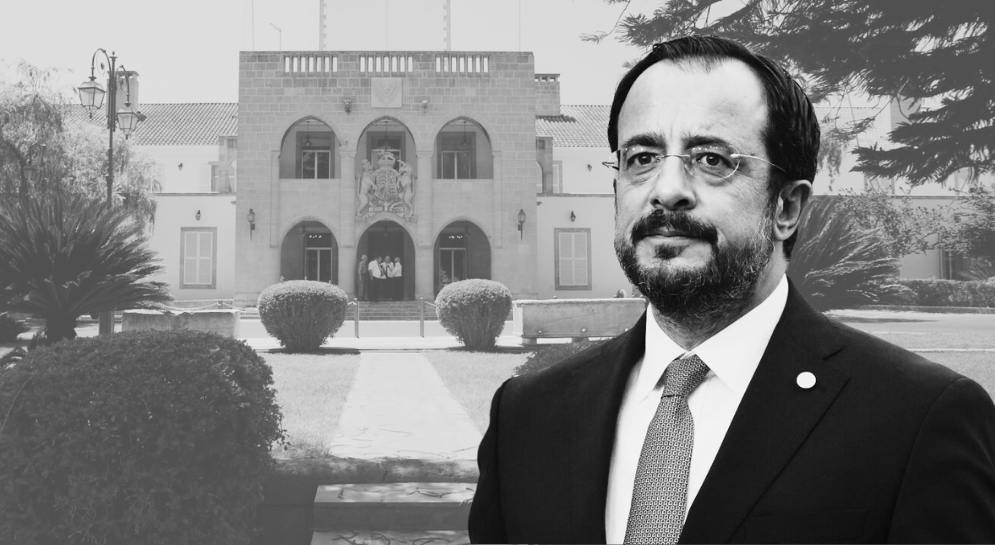
Interview with the General Secretary of AKEL A.Kyprianou
“Rally forces with AKEL for progressive change focused on people’s needs and interests”
Sunday 23rd May 2021, ‘Haravgi’ newspaper
Q: This isn’t the time for change, says the President and DISY, while they themselves promise change with the latest example being the economic growth model. What is the change that AKEL is seeking?
AK: The funny thing is that we hear DISY candidates asking people to vote for it “to achieve change”. Change what – will they remove DISY from power?
We aim to achieve progressive change both with regards the handling of the Cyprus problem and the tackling all the other issues – corruption and entanglement/interwoven interests, labour/social issues and so on. A different approach is demanded, which will focus on people and not based on people’s financial situation, as the DISY government is doing. The government cares about the rich and is completely indifferent to the many and the poor. We want a policy that focuses on the many and not on the few and the elite.
We want AKEL to emerge strong from the election as the strong voice of the people asserting their rights and secondly, to achieve the big change in 2023, representing the pole around which social movements and political forces will rally their forces.
Q: The majority of citizens today believe that all traditional parties are corrupt, attributing equal responsibilities to them all. How do you respond?
AK: AKEL can be proud that it has always stood against these phenomena of entanglement and corruption. It is a fact that certain actions that have been made in recent years, either for the right or wrong reasons, have given the impression to a section of the people that members of AKEL also participate in such phenomena. I will say that society has indeed influenced AKEL as well. What is AKEL’s qualitive difference from all the other parties? The difference is that AKEL recognizes the existence of these phenomena and strives to eradicate them. We have taken initiatives – both inside and outside Parliament – by submitting relevant legislation to limit the possibility for someone to be able to behave in this way. At the same time as far as we are concerned, as a party, where we ascertain such phenomena, we take drastic decisions and have made it absolutely clear to all party militants that anyone involved in such phenomena has no place in the party. I therefore consider that we are very different from those who, while involved in a series of scandals, declare themselves to be innocent and flawless.
Q: But what is AKEL doing to ensure that such cases do not occur?
AK: AKEL does not have the ability to know what each militant or member is doing in his/her professional or private life. What it can do is discuss these issues in its bodies. To send out clear messages that the party’s positions are crystal clear and that the Left and corruption cannot go hand in hand. Where it ascertains that such things do happen, it must take action. And of course, in my opinion, the personal example of leading members is something that will convey the correct messages.
Q: Just 12 days before the parliamentary elections, the government announced an economic recovery program. Do you think that it will be able to provide answers to the upcoming challenges and problems citizens face?
AK: This program is not new. This program is something that was announced several months ago by the EU itself, which asked member states to submit proposals for projects that are mature and can start in 2023 and be completed by 2025. A cross-party committee has been set up in which we are actively participating. AKEL has tabled numerous proposals, but the government hasn’t accepted anything we have proposed and insists on its own views that it had tabled from the outset.
The second thing I would like to point out is that the recovery and resilience program concerns 1.2 billion, not 4.4 billion. The other 1.8 billion concerns the EU Cohesion Fund and the third is a forecast made by the government itself, namely that investments amounting to 1.4 billion are expected to arrive in Cyprus in the coming years. These are words, since no one can know if this money will indeed come.
Meanwhile, the EU does not have this money for the recovery plan, but will get it through the increased contribution of its member states. That is, we will give the money. We will return the money over a period of a few years. So we shouldn’t believe that this money is borrowed and repayable.
Q: Can we say that the recovery fund is a Memorandum in another form?
AK: In some sense, yes we can – in the sense that the EU demands concrete action. If one agrees with these actions that’s all well, if one disagrees then the problems begin. For example, the Minister of Interior says that “if we do not implement the reform of Local Government, then we will lose € 1.2 billion”. This is a lie. The amount that is related to the reform is € 135 million. The second demand of the EU is the establishment of District Councils. We told the government, “Since there are disagreements on the reform of Local Government, bring forth the District Councils, on which we all agree, approve them, take the money from the EU so that they are not outstanding and we shall subsequently see the rest”. The government isn’t doing so and it is putting pressure on opposition parties. Such blackmailing methods will not work on us…
Q: President Anastasiades described the opposition as “seeking to deny prosperity to the country”. What is AKEL’s proposal on the direction the economy should follow?
AK: AKEL is the only political party which during the election campaign has submitted proposals on all major issues that concern the Cypriot people. We are constantly submitting proposals that have been elaborated in conferences and we are expressing our positions in public. One may disagree with our proposals and views, but we do have proposals.
Regarding all the talk about our supposed policy of “destructive opposition”, I think that Mr. Anastasiades should first look at himself in the mirror and ask himself: Is a person who pretends – mockingly that he forgot the name of the politician who criticized him, a serious politician? I’m saying the least so as not to say much more, such as the President’s involvement in the “golden” passport scandals, the issue of the President’s free holiday trips courtesy of the private jet belonging his Saudi tycoon friend with the granting of over 40 Cypriot passports to the tycoon’s wider family, the flight of money abroad from his close family circle, the scandal of the sell-off of the Cyprus Cooperative Bank, where one day he told us that everything was going perfect and the day after it collapsed like a house of cards.
Regarding his reference that he thinks about people’s prosperity, I will give an example: There are 5,000 teachers who are employed in Education Ministry’s afternoon and evening music, sports and all-day schools. When the DISY government came to power, these teachers were suddenly transformed from employees to self-employed. They went to court and won their case, with the court telling the government that they should be reinstated as employees. The government hasn’t reinstated them, forcing the teachers to go on strike. Is this the prosperity he wants to offer to these 5,000 people?
Q: The coronavirus pandemic highlighted the importance of state health structures. However, the government still downgrades the public health system. What should be done until the autonomy of public hospitals?
AK: The pandemic and handlings made by the government exacerbated the problems in public hospitals. We need, first and foremost, to assert an extension of the period for the provision of financial support towards public hospitals within the framework of the National Health Scheme.
Furthermore, a wider planning needs to be elaborated. A structure of the Ministry of Health as a whole, the state health services (OKYPY) and public hospitals must be established. OKYPY is proceeding with very long delays in their staffing. Without proper staffing and structures, we can’t expect problems to be addressed, the necessary clinics to be created and the appropriate staffing with medical, nursing and paramedical staff ensured.
Q: AKEL has set high among its priorities the abolition of the 12% penalty for those who choose to retire at the age of 63. However, the government says that the Social Insurance Fund will be threatened. Why does AKEL insist on this proposal?
AK: One month the government was telling us that the Social Insurance Fund is sustainable until 2080. When this demand was made, the government told us that the Insurance Fund would be put in danger. Which of the two is true? Secondly, the law provided that when one completes 33.5 years of work one should be entitled to a full pension. The Troika in 2012 to increase our retirement age – arguing that our life expectancy has increased – imposed this provision. We disagree with this provision. There are currently people employed in arduous occupations, such as construction workers, blacksmiths, plumbers and electricians, with some having completed 45 years of work.
These workers are being told that if they retire at 63, they will pay a 12% penalty. This is unacceptable. They have contributed and are entitled to get this money back.
Q: How do you respond to the government’s claim that AKEL brought and voted the Memorandum bill that includes provisions, so that from 2023 the age of retirement will be increased to gradually reach the 67th year?
AK: DISY forgets that at that time it was the most fanatical supporter of all these demands, even more than the Troika itself. The Christofias government resisted the Troika and DISY was accusing the government. It is a question of a different philosophy. We have always had the same philosophy. Back then because we had no choice, we had to accept some things. Now that things are different and there is no Troika to impose policies on us, I believe we can pursue our own policy.
Under no circumstances do we want to jeopardize the state’s financial ability to meet its obligations, but a redistribution of national wealth must take place. It is inconceivable that the rich are increasing their wealth and the poor see their incomes being reduced. The gap between the few rich and all the rest has widened. For example, we had the real estate tax as a wealth tax and unfortunately it was abolished as soon as DISY came to power. We therefore have to bring back such taxes to support people in need.
Q: Many left voters have been abstaining from elections for some years. Why should they go and vote for AKEL today?
AK: I understand the feelings of frustration that so many people may feel. We were elected for the first time as the Left and due to the global economic crisis we could not implement the program we had promised, although in many areas we had. However, the global economic crisis, which affected Cyprus too, and especially the banking crisis, which greatly affected the Cyprus economy and the Christofias government’s ability to deliver on all its promises, have left their mark.
I therefore believe now is the time for all these people to put aside their frustration, whatever feelings they may still have and join us in the effort to create the preconditions for the removal of the Anastasiades-DISY government from power. Now is the time to strengthen AKEL, so it can more effectively support their demands, to help them have a better life. What we will promise the people is that whatever power it gives us we shall more than give it back. Let them trust us and they’ll see that they will be vindicated
Q: You have described the situation on the Cyprus problem as “extremely dangerous”, but it seems that the President of the Republic confines himself to managing it until the next negative development. Is perhaps the Cyprus problem not his priority?
AK: The President’s stand makes the situation on the Cyprus problem even more dangerous. The fact that he is only interested in highlighting Turkey’s responsibility for the deadlock leads us nowhere. Turkey’s responsibilities are one aspect of why we are not moving forward. Turkey’s positions are unacceptable and lead nowhere. This does not lead to a solution.
Mr. Anastasiades needs to realize that the more time passes, the closer we get to partition. He needs to take such initiatives, which will put Turkey in a corner and at the same time give it incentives to return to the agreed framework of the solution. When we talk about incentives, we do not mean concessions regarding the principles of the solution of the Cyprus problem – not under any circumstances. On matters of tactics, however, we must be flexible.
Q: The President of the Republic has ignored AKEL’s proposal you submitted last December to corner Turkey, but you are ready to elaborate a new proposal. Why?
AK: The President not only did not invite us to discuss the proposal, as he had promised, but he responded publicly by distorting it. Discussing in the party bodies, we believe that this proposal is still relevant and can constitute the basis of an initiative. It could corner the Turkish side and pressure it to return to the agreed basis for a solution to the Cyprus problem. If not, then the Turkish side would be assigned full responsibility for what would follow.
Q: Do you think that Turkey has been exposed in the international and European community with its proposal for a two state solution that it has submitted?
AK: What is worrying is that despite the fact that Turkey has tabled an unacceptable proposal that no one can accept, the reaction of the international community has been lukewarm and timid. This is a result of the way in which the President had handled the Cyprus problem at Crans Montana and in the years that followed. The credibility of the President on the Cyprus problem is damaged. He doesn’t convince that he is genuinely interested in a solution. The narrative which the President is attempting to impose on public opinion with the help of numerous mass media is one thing and the narrative that the international community itself has is something else. I am referring to the United Nations and the EU and other important countries that can play a role on the Cyprus problem.
Q: The government is now threatening a new veto in view of the European Council. Can we achieve something different from the past, where this tactic was tried and failed?
AK: We have been warning since August 2019 – when the government said it would seek EU sanctions that will hurt Turkey – that this was a dead end policy. Developments themselves have proved that this policy did not work. I hope and wish that we won’t follow the same course today. Mr. Erdogan is talking openly about a ‘hot’ summer, and the international community is reacting very timidly to these threats. We are very afraid that we are losing the substance. And the essence is to find a way to end the Turkish aggression on the one hand and resume negotiations on the other. With the tactics Mr. Anastasiades is following we will not achieve none of that.
Q: Are the letters sent by Mr. Anastasiades to the international and European community and to Mr. Biden initiatives in the correct direction?
AK: Sending letters to inform is a positive development, but we do not know what the content of these letters is and what the goal is. If the aim is simply to denounce Turkey, I don’t think it serves our cause very well. It’s one thing to denounce Turkey’s unacceptable demands and its something else to create the preconditions for the resumption of the negotiations. The latter does not seem to interest Mr. Anastasiades.
Q: In such a case there is no reason to go to a new informal conference…
AK: If things stay as they are, I think it would be a mistake to go to a new conference.
Q: Were you informed at the National Council in Geneva about decentralized federation?
AK: No. It was said that some competences belonging to the central government could be delegated to the constituent entities. I haven’t heard to this day what these powers and competences are.
Q: Does the British proposal for a “middle-way solution” perhaps meet Anastasiades’ proposal for decentralized federation somewhat?
AK: I don’t think a British proposal exists. They had some ideas, which appear to contribute towards addressing the problems and at the same time they are interested in protecting their own interests, which are expressed through the presence of the Bases.
We also discussed these ideas with the High Commissioner of Britain and I was very adamant in the fact that as AKEL we will not accept anything more than the concession Mr. Anastasiades accepted in 2014 in the public announcement on the issue of sovereignty. The High Commissioner said Britain had never questioned the agreement, but had expressed some ideas on how to overcome the problems that exist with Turkey’s insistence on a two state solution. Ideas that I rejected and told him in no uncertain terms.
If we are discussing what competences each component state will have, it is easy to find them. If Mr. Anastasiades tells us what they competences are, we might discuss and agree, but we will not accept the bottom-up approach, because there are other meanings… Beyond that, the proposal for decentralized federation is coming and going and I have not heard the content of this proposal.




